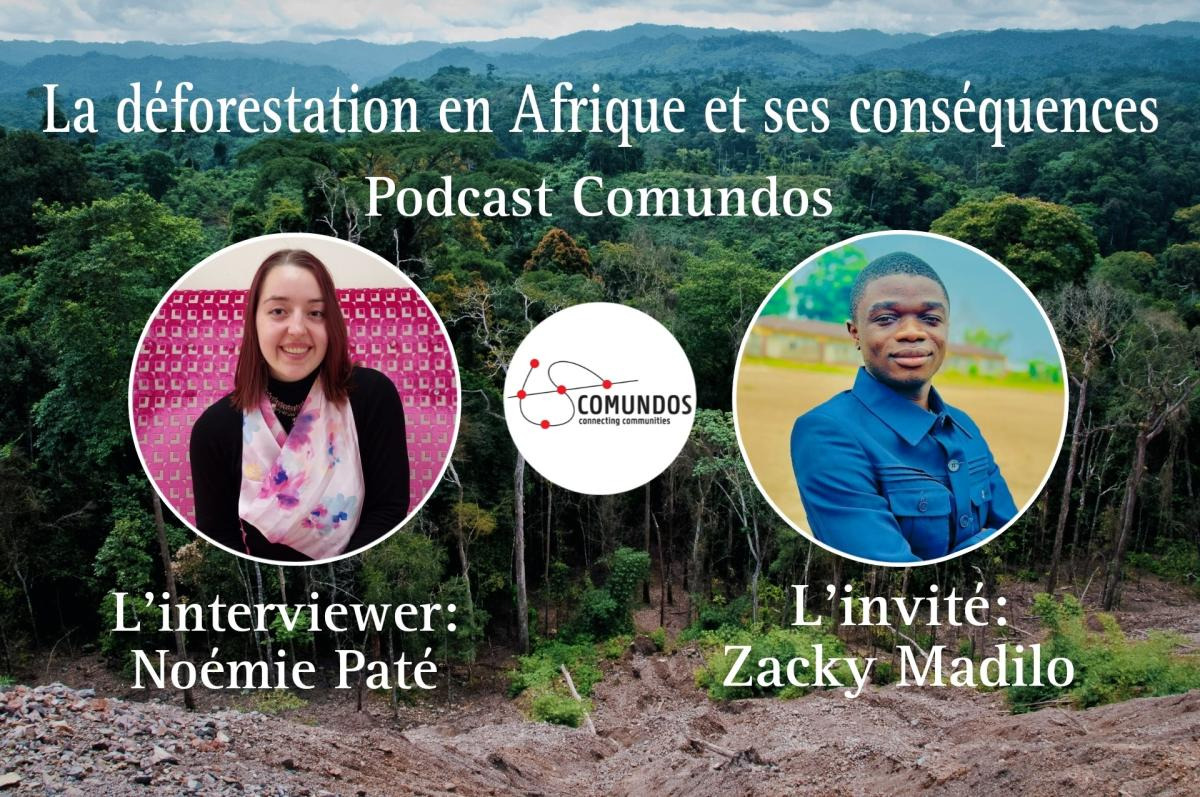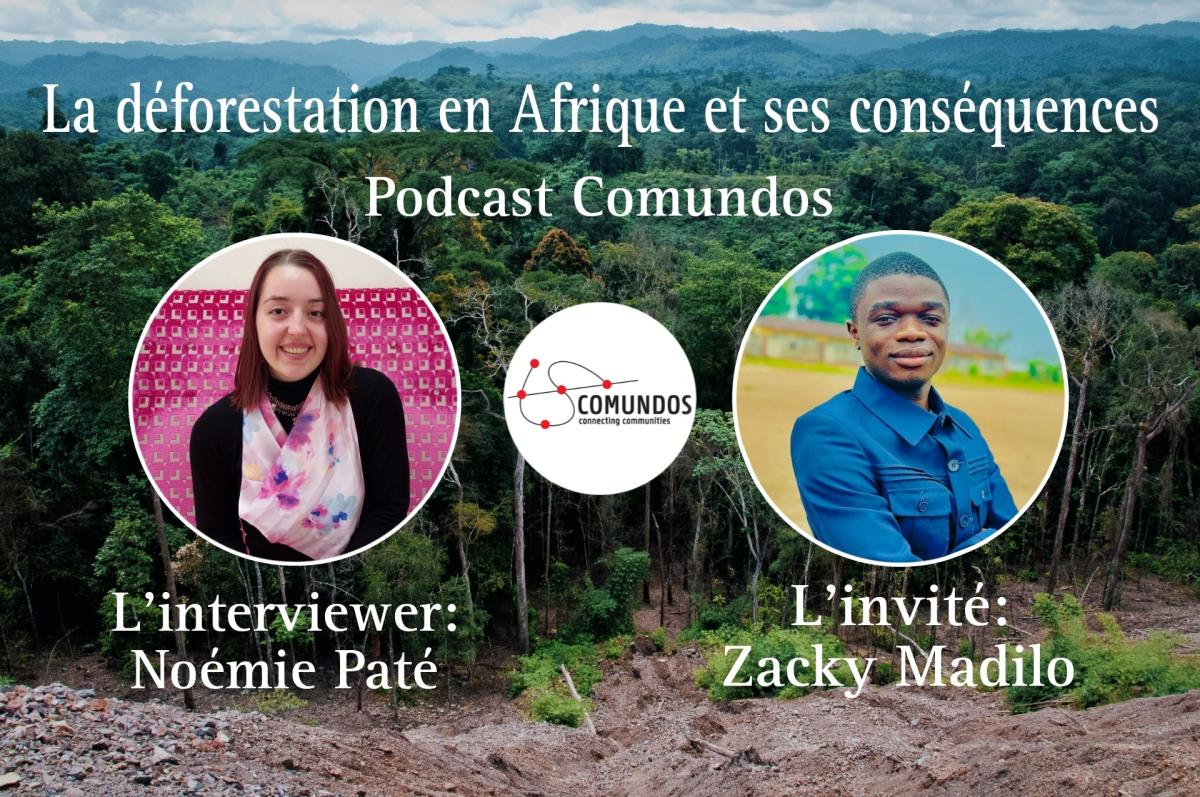Episode 05: Deforestation in Africa and its Consequences

This podcast interview follows a previous digital story by Zacky Madilo:
The Impact of the NGO FAJALOBI in the Locality of Idiofa, Democratic Republic of Congo
Enjoy!

Is humanity capable of surviving without forests? In Africa, the cradle of humanity, forests are vanishing at an alarming pace. This assessment was conducted by a pan-African panel from Congo, Cameroon, Benin and Senegal.
Host:
Welcome everyone to this Comundos podcast, where we engage in interviews with authors of digital stories. Our goal is to delve into their stories and gain a deeper understanding of the messages they aim to convey.
But before we begin, let us take a moment to reintroduce ourselves: Comundos is a non-profit organization dedicated to connecting communities. We strive to foster media literacy and promote digital storytelling as a means to empower young people worldwide. Our aim is to provide them with a voice, enabling them to express themselves and shed light on the issues that hold significance for them.
Hello, I'm Noémie Paté. We are delighted to have Zacky Madilo as our guest in today's episode. Zacky has produced a thought-provoking video on the topic of deforestation in Africa.
Welcome, Zacky! Could you please provide us with a deeper insight into the current state of forests in Africa and the impact climate change is having on them?
Guest:
Hello, Noémie. Extensive deforestation occurs annually in Africa, where large areas of forests are cleared for various purposes, including the extraction of valuable tree species and other uses. Additionally, substantial areas are unfortunately subject to unnecessary burning by the local population.
The impact of climate change in Africa is undeniably devastating. It contributes to the disappearance of natural habitats, the loss of biodiversity, and the extinction of numerous animal species. Furthermore, soil erosion is on the rise in many cities and countries. The implications of global warming pose a threat not only to specific regions but also to the entire world. However, it is disheartening that many individuals remain unaware of this imminent danger.
Host:
What are the main reasons for deforestation in Africa?
Guest:
Forests are being cut down for various reasons. Firstly, certain local communities face financial limitations and resort to felling trees to sell the timber. This serves as a means to provide for their families' needs and support the education expenses of their children. Additionally, forests are sometimes sacrificed to make way for agricultural land, as it often represents the sole source of income for farmers in those areas. Some people also cut down trees out of the belief that the forest will recover naturally, as God intended. Furthermore, across Africa, trees are used as firewood, to make planks, beams and huts. Additionally, the demand for hardwood and logs fuels their extraction, ultimately driving deforestation. A vivid example of this trade can be found in Cameroon, where a substantial number of trucks carrying felled timber are transported to the port on a weekly basis.
Host:
How can we stop deforestation and preserve Africa's forests?
Guest:
Planting trees should be the first action taken, and fortunately, several NGOs are already actively engaged in this endeavour. Equally important is the creation of awareness among residents living in forest areas regarding the significance of forests. Many individuals hold the misconception that forests will naturally recover on their own. It is vital to promote the responsible use of forests and find a balance between human needs and forest conservation. Encouraging the use of biochar is also essential, as it is a more environmentally friendly alternative to traditional charcoal, being derived from wood waste and other organic materials. Additionally, incorporating beekeeping practices can help mitigate forest fires resulting from vandalism. When people generate income from honey production, they are incentivised to safeguard both their beehives and the forest. Moreover, bees contribute to plant pollination, fostering biodiversity. Thus, keeping bees can serve as an excellent approach to environmental protection while simultaneously assisting local communities in generating income.
Host:
The solutions you have presented are great ideas. It is promising to see that there are several complementary approaches to conserving forests in Africa.
How can media literacy contribute to tackling deforestation in Africa?
Guest:
Media literacy is a vital tool in increasing public awareness about the impacts of climate change and global warming. By further developing this discipline, which offers significant communicative value, we can effectively inform and raise awareness among a large number of people about the challenges posed by deforestation and its consequences on our lives.
Host:
How has this experience shaped your perspective on the media? In what specific ways has it been beneficial to you?
Guest:
In my community, I've noticed a shift in people's media preferences. Nowadays, radio news seems to be less popular as more individuals gravitate towards spending their time online. Consequently, it becomes imperative for us to adapt our message dissemination strategies to reach a wider audience through various media platforms.
Building on this experience, I've effectively employed it to boost the visibility of our NGO, FAJALOBI. We've produced short videos that offer a concise glimpse into our organization, capturing the attention of viewers and generating interest in what we do.
Host:
It is truly fascinating to learn that you were able to leverage this experience to enhance the accessibility of your NGO, FAJALOBI.
As a concluding question, I would like to inquire about the valuable lessons you have acquired from your experience with Comundos.
Guest:
Thanks to Comundos, I acquired the skill of creating concise instructional videos, which serve as an effective educational tool for simplifying complex information. Recognizing its significance, I firmly believe in the importance of imparting this skill to a diverse range of individuals, particularly young people.
Host:
Thank you so much, Zacky, for providing such comprehensive answers to all of my inquiries. Through this interview, we have gained profound insights into the significance of conserving forests in Africa, along with the underlying causes of deforestation and potential solutions. Moreover, we have explored the crucial role of media literacy in raising awareness about environmental issues and their contribution to the fight against deforestation.
Thank you, dear listeners, for tuning in to this episode of the Comundos podcast. Be sure to explore our wide range of captivating episodes and immerse yourself in the abundance of digital stories waiting for you on our website, Comundos.org, and our YouTube channel. Embark on a journey with us as we delve into these captivating narratives.
A gift for Comundos
Over the years, Comundos has helped remote communities around the world by teaching critical thinking, media literacy and the use of communication technology.
To do this effectively, we need your support for computers, translations, courses and social media management.
Thank you .
BE11 1030 2973 8248




